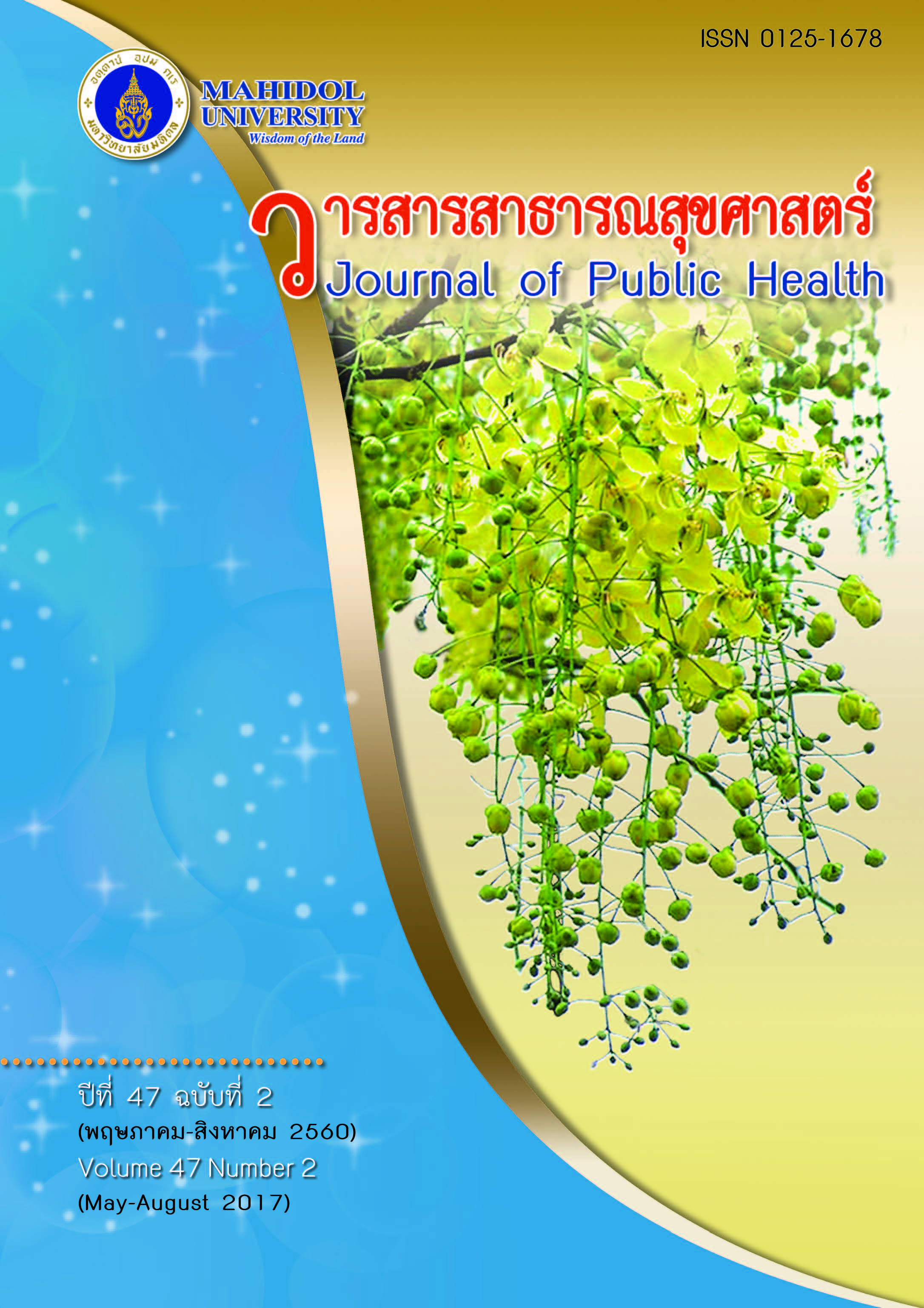ผลของโปรแกรมส่งเสริมการเลิกบุหรี่ของผู้ป่วยที่เข้ารับการบำบัดรักษายาเสพติดโรงพยาบาลแห่งหนึ่งในจังหวัดสงขลา
Keywords:
โปรแกรมส่งเสริมการเลิกสูบบุหรี่, การรับรู้ความสามารถตนเองในการเลิกบุหรี่, ความคาดหวังในผลดีของการเลิก, promoting smoking cessation program, self-efficacy to quit smoking and outcome expectation of smoking cessation, drug dependence disorder male patientsAbstract
การวิจัยกึ่งทดลองแบบกลุ่มเดียววัดผลก่อน-หลังครั้งนี้ มีวัตถุประสงค์เพื่อศึกษาผลของโปรแกรมส่งเสริมการเลิกบุหรี่ของผู้ป่วยชายที่เข้ารับการบำบัดรักษายาเสพติด โรงพยาบาลแห่งหนึ่งในจังหวัดสงขลา โดยประยุกต์ทฤษฎีปัญญาสังคม กลุ่มตัวอย่างเป็นผู้ป่วยระยะฟื้นฟูสมรรถภาพ โรงพยาบาลแห่งหนึ่งในจังหวัดสงขลา ที่มีความตั้งใจเลิกบุหรี่ ในขั้นเตรียมพร้อมปฏิบัติ จำนวน 23 คน มีระยะเวลาดำเนินกิจกรรมนาน 8 สัปดาห์ ประกอบด้วย 6 กิจกรรม ได้แก่ การสังเกตตนเอง การตัดสินใจ แสดงปฏิกิริยาต่อตนเอง การกระตุ้นเพื่อส่งเสริมแรงจูงใจ การให้คำปรึกษารายบุคคล และการจัดสภาพแวดล้อม เก็บข้อมูลก่อนและหลังการทดลองในสัปดาห์ที่ 4 และ 8 ด้วยแบบสัมภาษณ์ วิเคราะห์ข้อมูลด้วยสถิติเชิงพรรณนา Paired Sample T-test, Cochran’s Q Test และ Friedman Test ผลการทดลองพบว่า หลังการทดลองในสัปดาห์ที่ 4 กลุ่มตัวอย่างมีการรับรู้ความสามารถของตนเองในการเลิกบุหรี่และความคาดหวังในผลดีของการเลิกบุหรี่ดีขึ้นกว่าก่อนการทดลองอย่างมีนัยทางสถิติ (p < 0.05) รวมทั้งเลิกสูบบุหรี่ได้ 5 คน ร้อยละ 21.7 และในสัปดาห์ที่ 8 พบว่า กลุ่มตัวอย่างเลิกสูบบุหรี่ได้ 9 คน ร้อยละ 39.1 ดังนั้น โปรแกรมนี้ช่วยให้กลุ่มตัวอย่างที่อยู่ในระยะฟื้นฟูสมรรถภาพยาเสพติดนี้ เลิกสูบบุหรี่ได้ จึงสามารถนำไปใช้กับสถานบริการสาธารณสุขที่มีบริบทใกล้เคียงกันได้
Effects of Promoting Smoking Cessation Program in Drug Dependence Disorder Patients at a Hospital in Songkhla Province
This quasi-experimental research aimed to examine the effects of promoting a smoking cessation program in drug dependence disorder patients at a Hospital in Songkhla Province applying the Social Cognitive Theory. The subjects comprised 23 current smokers with drug dependence who were admitted at the rehabilitation unit, at a hospital in Songkhla Province. This program was conducted over a period of 8 weeks and comprised 6 activities including self-observation, judgment process, self-reaction, motivation, individual counseling and smoke-free environments. Data were collected by interviews at pre- and postintervention on the 4th and 8th weeks. Statistical analysis was performed using descriptive statistics and inferential statistics, i.e., Paired Sample t-test, Cochran’s Q test and Friedman test. The results showed that the samples had significantly higher mean scores of perceived self-efficacy to quit smoking and outcome expectation of smoking cessation at post intervention in the 4th week (p < 0.05). In addition, 5 of 23 current smokers (21.7%) and 9 of 23 current smokers (39.1%) were able to quit smoking, at postintervention on the 4th and 8th weeks, respectively. In conclusion, the smoking cessation program could help smokers to stop smoking so it should be applied to any similar health service facilities
Downloads
Published
Issue
Section
License
Creative Commons License CC-BY-ND


